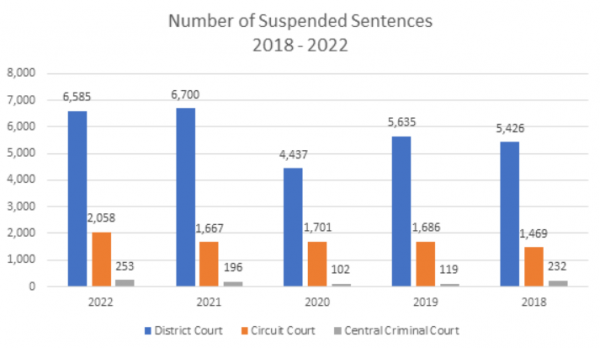Explainer: Suspended sentences
27th February 2024
What is a suspended sentence?
A suspended sentence is a prison sentence, where its operation is suspended for a defined period of time if the person convicted of an offence abides by certain conditions provided by the judge.
This means that the person does not go to prison for a suspended sentence if they abide by the conditions provided by the judge.
If the person breaks a condition while the sentence is suspended, they may have to serve the prison term that was originally imposed.
When can a suspended sentence be imposed?
A suspended sentence may be imposed for any offence that is punished by a term of imprisonment, except where that term of imprisonment is mandatory (for example, a murder conviction has a mandatory life sentence).
What is the legal basis for a suspended sentence?
Section 99 of the Criminal Justice Act 2006 (as amended) provides the legal basis for suspended sentences.
Statistics on how often suspended sentences are used in Ireland (where available)
The Law Reform Commission analysis of sentencing in the courts suggests that there has been a decrease in the use of suspended sentences in the Circuit Court for some offences. In 2006, 40 per cent of all sanctions imposed for offences in the Circuit Court were suspended, compared to 17 per cent in 2017.
This trend appears to be continuing in this direction, based on a review of the sentencing in the Circuit Courts for 2019 – 2022, the percentage of all sanctions (“orders”) that were suspended were 14.8 per cent in 2018, 16 per cent in 2020 and 15.6 per cent in 2022.

These figures are all taken from the Annual Reports of the Courts Service.
Suspended sentences are most often used in the District Court.
Additional relevant information
Children
Suspended sentences are not used where a child convicted of a criminal offence is sentenced to a period of detention. (Read more)
Further explanation on the two types of suspended sentence
There are two types of suspended sentence: (1) the fully suspended sentence and (2) the part-suspended sentence.
- Fully suspended sentence: A fully suspended sentence is where a judge imposes a prison sentence but suspends it on certain conditions. Whether the convicted person goes to prison or not depends on whether they break these conditions.
- Part-suspended sentence: A part-suspended sentence has two parts: an immediate term in prison followed by the suspended sentence period.
In either case, a suspended sentence cannot go on indefinitely, it only lasts for as long as set out by the court.
Types of Conditions
- Mandatory condition: A person who receives a suspended sentence must keep the peace and be of good behaviour during the suspension period; for example, they must not commit another offence.
- Additional conditions: The court can impose any suitable conditions that it thinks will reduce the probability of the convicted person committing another offence; for example, co-operating with the probation service or undergoing treatment for addiction, doing a course of education, training, therapy, psychological counselling, or other treatment.
- Effect of breaking the conditions of suspension: If a condition is broken while the sentence is suspended, the court may order the prison term to be served. The court can activate all or part of the term of imprisonment.
Related items:
- Invitation to Tender: Rethinking Remand - Exploring current pre-trial detention practices and examining potential alternatives that protect individuals’ rights and reduce unnecessary detention
- Life Sentences and Whole Life Orders - IPRT
- Liberties EU Rule of Law Report 2025
- IPRT letter to the Sentencing Guidelines and Information Committee consultation on guidelines for crimes committed in the context of an intimate relationship
- RTÉ Drivetime: Prison overcrowding and the Programme for Government




